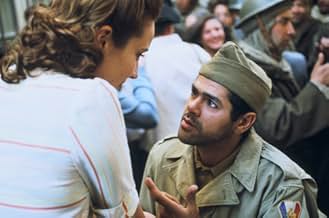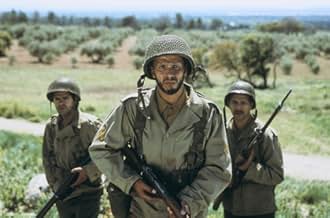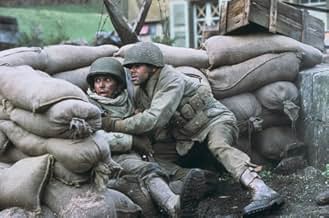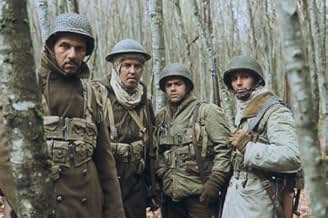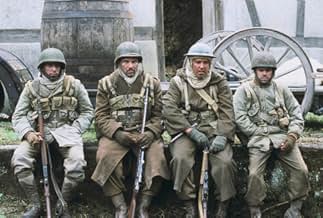VALUTAZIONE IMDb
7,0/10
15.450
LA TUA VALUTAZIONE
Aggiungi una trama nella tua linguaDuring World War II, four North African men enlist in the French army to liberate that country from German oppression, and to fight French discrimination.During World War II, four North African men enlist in the French army to liberate that country from German oppression, and to fight French discrimination.During World War II, four North African men enlist in the French army to liberate that country from German oppression, and to fight French discrimination.
- Regia
- Sceneggiatura
- Star
- Candidato a 1 Oscar
- 9 vittorie e 17 candidature totali
Recensioni in evidenza
I did not know what to expect from this movie starring guys like Djamel Debbouzze or Samy Naceri, more used to non sense jokes and wrong way taxi driving, but I must say I was astonished.
First pictures are beautiful, dialogs and pace slow but efficient.
Second the way the four main characters perform is great (although Naceri is maybe not quite as good as the three others). All moved by different motivations, they have a sole dream: to be a real part of it, a part of the French country they have been fighting for. And they make you believe it. Not only because they fit perfectly into their roles, but also because the suffering and the inequalities they undergo in the war fields of the movie still exist six decades after in their every day life.
"All animals are equal, but some are more equal than others". True it was in Provence or in Alsace, true it is in today's France.
To me this film is more than the French Private Ryan, it is a subtle way to ask: "how much more is it going to take before we can all be on the same boat ?" Go and see it.
First pictures are beautiful, dialogs and pace slow but efficient.
Second the way the four main characters perform is great (although Naceri is maybe not quite as good as the three others). All moved by different motivations, they have a sole dream: to be a real part of it, a part of the French country they have been fighting for. And they make you believe it. Not only because they fit perfectly into their roles, but also because the suffering and the inequalities they undergo in the war fields of the movie still exist six decades after in their every day life.
"All animals are equal, but some are more equal than others". True it was in Provence or in Alsace, true it is in today's France.
To me this film is more than the French Private Ryan, it is a subtle way to ask: "how much more is it going to take before we can all be on the same boat ?" Go and see it.
It's 1943 Algeria. Muslims are recruited to fight for France. They go to Morocco to train and then arrive in Italy in 1944 to fight with the Allies. Saïd Otmari is poor illiterate mountain goat herder. Messaoud Souni is well spoken and falls for a French woman. Sergeant Martinez is a hardened leader willing to send the green recruits into suicidal charges but he hides his personal Arab connections. The men face racism in many blatant ways and Abdelkader gives voice to getting more equality.
This is an interesting part of the war that has been white-washed. The movie does struggle with a simple message as the men themselves have infighting about the war and their cause. Some of them fight for the money while others bought into the slogans. There is some good action and a solid final battle.
This is an interesting part of the war that has been white-washed. The movie does struggle with a simple message as the men themselves have infighting about the war and their cause. Some of them fight for the money while others bought into the slogans. There is some good action and a solid final battle.
In World War II, the Muslims from French colonies enlist to fight for their motherland France. In the 7th battalion commanded by the tough Sergeant Roger Martinez (Bernard Blancan), the soldier Abdelkader (Sami Bouajila) has leadership with the troop and seeks promotion and recognition from the command; Said Otmari (Jamel Debbouze) is a servile and illiterate private, happy in serving his sergeant; Messaoud Souni (Roschdy Zem) is the sniper of the group and has fallen in a corresponded love with the French Irène (Aurélie Eltvedt); and Yassir (Samy Naceri) is fighting together with his brother to raise some money. Along the campaign in Italy, France and Alsace, they realize that French soldiers are promoted, have better food and have leaves to visit their families, while the Arab soldiers are shamefully discriminated and treated like 2nd ranking soldiers.
"Indigènes" is an excellent movie of war, disclosing an unusual theme: the discrimination of the soldiers from the French colonies in World War II. The anti-Semitism is presented in most of the films about WWII; racism and segregation with the American soldiers has been explored in a couple of movies; but the treatment spent to the Arab soldiers in World War II by France command is the first time that I see in a movie. The screenplay, the direction, the performances, the pace and the cinematography are great and gives a magnificent homage to these forgotten and discriminated heroes. The lack of payment of pension plan to the survivors and families by the French government is another example of the level of intolerance and lack of respect in the world of the present days. In the end, it is a great deception that the beautiful message "Liberty, Equality and Fraternity" is not applicable to the soldiers from the exploited colonies. My vote is eight.
Title (Brazil): "Dias de Glória" ("Days of Glory")
"Indigènes" is an excellent movie of war, disclosing an unusual theme: the discrimination of the soldiers from the French colonies in World War II. The anti-Semitism is presented in most of the films about WWII; racism and segregation with the American soldiers has been explored in a couple of movies; but the treatment spent to the Arab soldiers in World War II by France command is the first time that I see in a movie. The screenplay, the direction, the performances, the pace and the cinematography are great and gives a magnificent homage to these forgotten and discriminated heroes. The lack of payment of pension plan to the survivors and families by the French government is another example of the level of intolerance and lack of respect in the world of the present days. In the end, it is a great deception that the beautiful message "Liberty, Equality and Fraternity" is not applicable to the soldiers from the exploited colonies. My vote is eight.
Title (Brazil): "Dias de Glória" ("Days of Glory")
So you've done a great piece of work, and are awaiting your just rewards. Somehow along the way, someone else, by colour, creed, or connections, get all the recognition that you're due credit for. You feel frustrated, but you think of your rice bowl, and decide to grit your teeth and bear it, calling it just another day, secretly longing for a time where you are empowered to do something about it.
In the liberation of France during WWII, North African men were recruited and enlisted in the French army in the fight against the Nazis. Why do they do it? One reason is to escape poverty, and the holding on to the glimmer of hope that they can be accepted, when the war is over, as equals based on their fight for the "motherland". These soldiers, mujahedeens, fought hard, often being in the frontline, but always overlooked when it comes to recognition of basic military welfare and promotions, not that these rewards will cost an arm or a leg, nor are the fighters so hard up for them. All they're asking for was fair treatment, but all they got was discrimination.
Yes, and that is the pain. WWII movies are aplenty, but Days of Glory offered a unique look at the battles by a group of men, for what they deem their motherland and will defend with their blood, and what more, for a land of people who do not see them as equals. Loving someone who does not love you back, sounds familiar? And it's not just love, but sworn allegiance to protect at all costs.
The movie is well paced and straddled moments of action and quiet contemplation with aplomb. Credit must go to the ensemble cast of actors who play the warriors of North Africa, as they battle both the enemies on French soil, as well as enemies of men's heart. They grapple with trying to remain rational in their reason(s) to do what they're doing.
At times, watching this movie made me think about the recent flurry of mails to the press about foreign talent and the issue of citizenship, about NS obligations and whether PRs will flee at the first signs of trouble, or stand shoulder to shoulder with citizens (also, who are those who will flee?) in defending our land. What are the issues of contention, discrimination against, or general presumptions about foreigners here?
Those expecting all out battle scenes might be disappointed. In truth the movie's never about the glorification of gore, violence and war - most scenes aren't really blood splattering to draw in the crowds. Instead, if you'd prefer moments where you can think out loud about the issues presented, then this is for you. However, the final battle would please action fans, as it is well choreographed and executed, and you feel both the pain and victory from a bunch of tightly knit soldiers trying their very best to defend a small town, in a samurai- seven-ish sort of way, also reminiscent of Saving Private Ryan's somehow.
If you've missed this during the French Film Festival, don't fret. I believe this movie is also slated for general release. Keep a look out for it!
In the liberation of France during WWII, North African men were recruited and enlisted in the French army in the fight against the Nazis. Why do they do it? One reason is to escape poverty, and the holding on to the glimmer of hope that they can be accepted, when the war is over, as equals based on their fight for the "motherland". These soldiers, mujahedeens, fought hard, often being in the frontline, but always overlooked when it comes to recognition of basic military welfare and promotions, not that these rewards will cost an arm or a leg, nor are the fighters so hard up for them. All they're asking for was fair treatment, but all they got was discrimination.
Yes, and that is the pain. WWII movies are aplenty, but Days of Glory offered a unique look at the battles by a group of men, for what they deem their motherland and will defend with their blood, and what more, for a land of people who do not see them as equals. Loving someone who does not love you back, sounds familiar? And it's not just love, but sworn allegiance to protect at all costs.
The movie is well paced and straddled moments of action and quiet contemplation with aplomb. Credit must go to the ensemble cast of actors who play the warriors of North Africa, as they battle both the enemies on French soil, as well as enemies of men's heart. They grapple with trying to remain rational in their reason(s) to do what they're doing.
At times, watching this movie made me think about the recent flurry of mails to the press about foreign talent and the issue of citizenship, about NS obligations and whether PRs will flee at the first signs of trouble, or stand shoulder to shoulder with citizens (also, who are those who will flee?) in defending our land. What are the issues of contention, discrimination against, or general presumptions about foreigners here?
Those expecting all out battle scenes might be disappointed. In truth the movie's never about the glorification of gore, violence and war - most scenes aren't really blood splattering to draw in the crowds. Instead, if you'd prefer moments where you can think out loud about the issues presented, then this is for you. However, the final battle would please action fans, as it is well choreographed and executed, and you feel both the pain and victory from a bunch of tightly knit soldiers trying their very best to defend a small town, in a samurai- seven-ish sort of way, also reminiscent of Saving Private Ryan's somehow.
If you've missed this during the French Film Festival, don't fret. I believe this movie is also slated for general release. Keep a look out for it!
France 1943. Indigenous Moroccan soldiers still wet behind the ears are called in to the 17th infantry to defend their 'motherland' against the ongoing German occupation. Their goodness and patriotism are unmistakable and Saïd (Jamel Debbouze) remarks how "If I liberate a country, it's my country, even if I've never even been there." Here is a good-hearted contingent of North African soldiers who hope to catch some of the victory's glory, but whom are repeatedly shifted to the backseat because of their name, skin and accent.
There was no way I would miss a film that French president Chirac cites as the sole reason he immediately rectified the pension plan for indigenous veterans, offering them the promise of equality for the law for the first time. Indigènes is puffed full of political correctness with heavy-handed treatment of salient issues such as racism, inequality and intolerance. But we do not mind, because the film so rigorously establishes a brotherhood feeling with our triumvirate of central characters that we find ourselves completely engrossed in their struggle, rooting for them, laughing with them and often crying because of them.
In the front row for sympathy sits Saïd, Yassir, Messaoud and Abdelkader, all inhabited by capable unknown actors with great emotional transparency. Saïd is a kind of clumsy teddy bear who kisses his mom goodbye in Morocco and immediately botches his way through combat, even choking on the victorious scotch and fumbling with the token victor's cigar when the first battle has been won. These are heartbreakingly real people. Arguably even the hard-edged Sergeant elicits a warm response when he unflinchingly takes on the father-role for the contingent he is rough, harsh, cynical but fair. The male ensemble won the Cannes award for 'Best Actor' earlier this year, which solidifies their collective likability and serve as a mark of the film's warm cast centre. If you want to nitpick, it needs to be said that some moments (such as key death scenes), although tragic, inexplicably lack the propelling poignancy to elicit tears. Why this is I do not know, but it ought to be attributed to the film and not the superb performances.
When the squad of wet puppies make their way across the motherland, they are faced with two disturbances: the internal conflicts that arise in the army when it becomes apparent that North African soldiers are not given the same treatment as native French (no tomatoes, no weekend leaves, no promotions and no glory) and the gruesome reality on the battlefield. The former is captured safely but compellingly through little rants, intense stares and cries of "Liberté, Egalité, Fraternité!" all in the token French political spirit. The latter, however, is Indigènes' true goldmine. No description will do the warfare sequences justice; they need to be seen. Think Call of Duty plugged into the silver screen, with epileptic zooming, fast-paced action, gory reality, humming rocket launchers and one massive sense of immediate danger. It nearly puts Steven Spielberg's warmovie fare to shame.
The cinematography channels one storyline from 'Babel', from the epic aerial shots of the craggy hills and desert-laden plains of Morocco to a juxtaposition of lush French soil. Even the French sheets are a great source of awe for the North African soldiers. Much like 'Babel', the film never shies away from blending equal amounts of Arabic and French into the dialogue, something that reinforces the realism.
Indigènes (2006) is an excellent film with strong performances and a strong, political core. Its flaws, however apparent, are generally marginal. The one thing that jumped out and grabbed me, striking me as below average, was the hammy and inexcusably hackneyed score. When Arabic soldiers are fighting for their lives and bleeding in the process, slapping on a dutiful ethnic score that sings and wails like it means business, the film is just preaching to the choir. If I hear an "epic, ethnic" score in a movie like this again, I will probably go out and kill someone either the Arab who is singing, or the stupid Westerner who thinks mainstream audiences need everything spelled-out for them with this mandatory music inclusion.
Aside from this minor misstep, Indigènes is a worthy merit to France's resumé of films, one that will surely be a frontrunner for the Best Foreign Language Film Award at the Oscars next year. Nevermind that this is an excellent and real film, the competent political notions may just be enough to tip things over in its favour.
8 out of 10
There was no way I would miss a film that French president Chirac cites as the sole reason he immediately rectified the pension plan for indigenous veterans, offering them the promise of equality for the law for the first time. Indigènes is puffed full of political correctness with heavy-handed treatment of salient issues such as racism, inequality and intolerance. But we do not mind, because the film so rigorously establishes a brotherhood feeling with our triumvirate of central characters that we find ourselves completely engrossed in their struggle, rooting for them, laughing with them and often crying because of them.
In the front row for sympathy sits Saïd, Yassir, Messaoud and Abdelkader, all inhabited by capable unknown actors with great emotional transparency. Saïd is a kind of clumsy teddy bear who kisses his mom goodbye in Morocco and immediately botches his way through combat, even choking on the victorious scotch and fumbling with the token victor's cigar when the first battle has been won. These are heartbreakingly real people. Arguably even the hard-edged Sergeant elicits a warm response when he unflinchingly takes on the father-role for the contingent he is rough, harsh, cynical but fair. The male ensemble won the Cannes award for 'Best Actor' earlier this year, which solidifies their collective likability and serve as a mark of the film's warm cast centre. If you want to nitpick, it needs to be said that some moments (such as key death scenes), although tragic, inexplicably lack the propelling poignancy to elicit tears. Why this is I do not know, but it ought to be attributed to the film and not the superb performances.
When the squad of wet puppies make their way across the motherland, they are faced with two disturbances: the internal conflicts that arise in the army when it becomes apparent that North African soldiers are not given the same treatment as native French (no tomatoes, no weekend leaves, no promotions and no glory) and the gruesome reality on the battlefield. The former is captured safely but compellingly through little rants, intense stares and cries of "Liberté, Egalité, Fraternité!" all in the token French political spirit. The latter, however, is Indigènes' true goldmine. No description will do the warfare sequences justice; they need to be seen. Think Call of Duty plugged into the silver screen, with epileptic zooming, fast-paced action, gory reality, humming rocket launchers and one massive sense of immediate danger. It nearly puts Steven Spielberg's warmovie fare to shame.
The cinematography channels one storyline from 'Babel', from the epic aerial shots of the craggy hills and desert-laden plains of Morocco to a juxtaposition of lush French soil. Even the French sheets are a great source of awe for the North African soldiers. Much like 'Babel', the film never shies away from blending equal amounts of Arabic and French into the dialogue, something that reinforces the realism.
Indigènes (2006) is an excellent film with strong performances and a strong, political core. Its flaws, however apparent, are generally marginal. The one thing that jumped out and grabbed me, striking me as below average, was the hammy and inexcusably hackneyed score. When Arabic soldiers are fighting for their lives and bleeding in the process, slapping on a dutiful ethnic score that sings and wails like it means business, the film is just preaching to the choir. If I hear an "epic, ethnic" score in a movie like this again, I will probably go out and kill someone either the Arab who is singing, or the stupid Westerner who thinks mainstream audiences need everything spelled-out for them with this mandatory music inclusion.
Aside from this minor misstep, Indigènes is a worthy merit to France's resumé of films, one that will surely be a frontrunner for the Best Foreign Language Film Award at the Oscars next year. Nevermind that this is an excellent and real film, the competent political notions may just be enough to tip things over in its favour.
8 out of 10
Lo sapevi?
- QuizThe main actors, all of North African descent, did not know of France's discrimination towards foreign soldiers serving in the French army during World War 2 until filming began.
- BlooperIn the scene when the African soldiers raise the French tricolor over the Italian mountain top, the flag they use is polyester (i.e. a contemporary flag). World War II troops would have used a cotton flag.
- ConnessioniFeatured in Indigenes: Le making of (2006)
- Colonne sonoreLe lac des cygnes
Composed by Pyotr Ilyich Tchaikovsky
I più visti
Accedi per valutare e creare un elenco di titoli salvati per ottenere consigli personalizzati
- How long is Days of Glory?Powered by Alexa
Dettagli
Botteghino
- Budget
- 14.500.000 € (previsto)
- Lordo Stati Uniti e Canada
- 320.700 USD
- Fine settimana di apertura Stati Uniti e Canada
- 10.996 USD
- 10 dic 2006
- Lordo in tutto il mondo
- 22.963.701 USD
- Tempo di esecuzione
- 2h 3min(123 min)
- Colore
- Mix di suoni
- Proporzioni
- 2.35 : 1
Contribuisci a questa pagina
Suggerisci una modifica o aggiungi i contenuti mancanti


